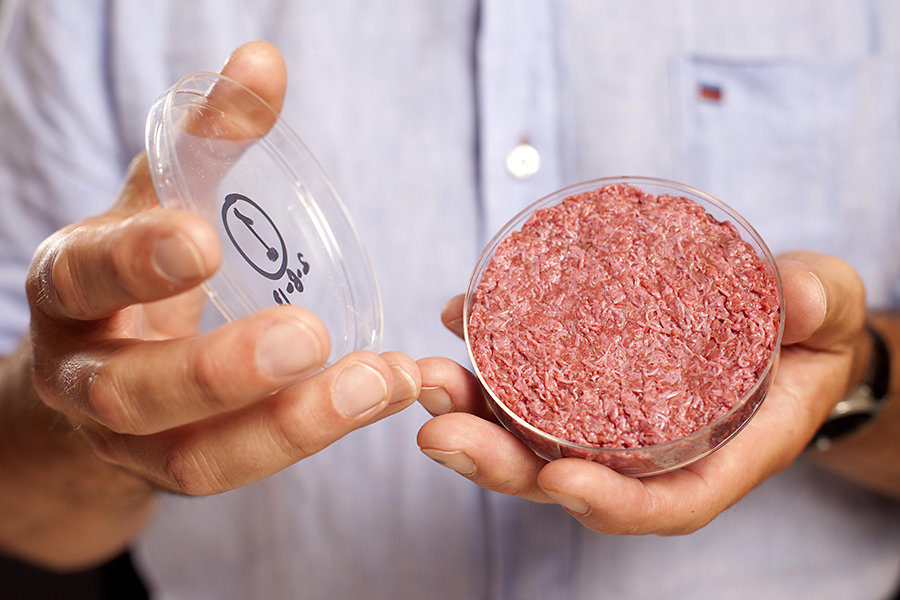Afternoon Inquisition 5.21
This article at Time.com suggests that the excitement surrounding Ida , the 47 million year-old pristine primate fossil, has been a bit overblown in the recent press releases following the paper published by paleontologists. The story has been hyped in various publications, news outlets, and blogs as “a revolutionary scientific find that will change everything”.
Ida could be a transitional animal that gave rise to the prosimians and, ultimately, to humans, and the find is in fact very important to the study of primate evolution. However, it is not certain, and probably not even likely, that her discovery will “change everything”. At least not without a lot of extra work, including further discoveries.
Given the objective nature of science, does the press do it a disservice by over-hyping stories in this manner? Or is it just good marketing, ensuring that even those with little interest in science will become interested?





Oh gosh. I think the MSM does a poor job of explaining anything, and mostly does the hype and the bullet points. If people would take the little bit of information and then go and research further, maybe its okay, but I think generally, most people won’t take that step. I think the media hype over Ida is confusing people further, and why is it this fossil and not others that have been found? Surely this isn’t the only new discovery?
What irks me is when some overzealous science writer gets hold of a newly published paper. “Scientists Say Moon Could be Made of Cream Cheese!” Of course, the rest of the science community hasn’t had a chance to look at it yet, but the damage is done. And when they come out with the consensus opinion that there’s no cheese of any kind on the Moon it’ll be buried on page 178, if reported at all.
I think hyping this as “the missing link to human evolution” is only going to confuse people and then fuel the anti-evolution crowd since, clearly, this animal has a TAIL. People hear missing link and they think this is the transitional model between Neanderthal (or whatever) and us. But then they see an animal that clearly doesn’t look like us or like a monkey and they go, “that makes no sense.” And it gives a little bit more fuel to the anti-evolution fire.
I do like the fact that Google had it as their special logo for the day. So even if it is overblown, maybe someone, somewhere will click on it and learn some science.
I think it is a good thing. To those tuned into science it is an incremental improvement to our knowledge. To most people, who think about evolution once a decade or so, it puts the idea back into the public consciousness for a news cycle. So what if it’s a little oversold? One thing I liked best about this piece is they made it clear that they don’t view this fossil as our direct ancestor which launched into a discussion of the branching nature of evolution. I don’t see this topic covered much in the popular media.
@FFFearlesss: “People hear missing link and they think this is the transitional model between Neanderthal (or whatever) and us.”
Mmm. Neanderthal. Tastes like chicken.
I’d be ok with the hype if they didn’t use loaded words so often. It is possible to sell science without having to fudge the language around it. Calling Ida the “missing link” is a straight out lie and is giving the Creationists plenty of ammo to call this a hoax.
@mikespeir:
Speaking of Mooncheese….Two DNA quotes:
1) I don’t accept the currently fashionable assertion that any view is automatically as worthy of respect as any equal and opposite view. My view is that the moon is made of rock. If someone says to me “Well, you haven’t been there, have you? You haven’t seen it for yourself, so my view that it is made of Norwegian Beaver Cheese is equally valid†– then I can’t even be bothered to argue. There is such a thing as the burden of proof, and in the case of god, as in the case of the composition of the moon, this has shifted radically. God used to be the best explanation we’d got, and we’ve now got vastly better ones.
and
2) All opinions are not equal. Some are a very great more robust, sophisticated and well supported in logic and argument than others.
-Douglas Adams
I’ve discovered a correlation between the number of over-hyped news articles and global surface temperatures. Both have risen dramatically in the past decade. I’m hoping the story will get picked up by the media and eventually foxnews.com will run “Sensationalistic News Causes Global Warming!” on their front page.
It’s not the hype in particular that bothers me so much, it’s the bad interpretation that the media does. The term “missing link” just demonstrates a complete lack of understanding of evolutionary theory. I wish they would report things more accurately, even if it makes some people bored. Something like this makes it sound as though we are specifically trying to prove something to creationists, or it makes it seem like there just wasn’t enough evidence to support evolution before this.
Also, don’t get me started on the dismal quality of reporting on statistics.
“””Given the objective nature of science, does the press do it a disservice by over-hyping stories in this manner?”””
I don’t see why media should follow scientific standards. I guess over-hyping is both the only language press speaks and the only way for a science news items to appear on the news. If the choice is between over-hyping or no science news at all, then hell yes, let them over-hype every single science minutia until people can recite the definition of gluon. The disservice would only follow if people could tell the actual importance of any particular science item, but since this risk cannot be realistically expected, everything is fine.
“””Or is it just good marketing”””
Everything is marketing, I guess.
“””ensuring that even those with little interest in science will become interested?”””
I don’t think you can ensure that, not to say in a productive way (bombarding people with science items won’t necessarily produce scientists), but at least you can gain visibility.
Personally, as much as I like paleontology, I don’t even think this is a particularly marketable finding, so I wonder whose connections have been at play here. I would rather have sports news commenting on the physics of basketball shoes, of racing cars or of a baseball’s flight, to make children wonder about the facts behind things they are daily exposed to (other than family fossils ;-). They would become addicted to finding out ways to improve all of that and would naturally become science junkies.
I’ve seen it works. They do it in Vulcan :-D
Carl Zimmer calls shenanigans on PLoS ONE and The History Channel.
Bora has been silent since he trumpeted the initial announcement, but he’s got some ‘splainin’ to do.
I think anything the media reports is expected to have the full credibility of the media outlet that’s reporting it, so when they put words in scientist’s mouth, like making this in to a huge find that will shake the world and turn your balls orange, people believe it to the same extent they believe anything on the news (and the pattern I’ve observed is everyone thinks all the news stations are crap, except the one they watch, their station gets it right). So, if they dig in to it and find that this isn’t so, the media is held blameless and people wonder what those stupid, stupid scientists were thinking. Don’t they have any common sense? Clearly the ivory tower has gone to their head. And on goes the media, instilling cynicism in people about experts of all kind, because first class minds have to be matched in kind with wackos, because there are exactly two sides to every story, and they have equal weight. So, harm is done. I don’t know if that’s more than the benefit, but when I hear anything that’s made the news come up in conversation, people are usually discussing it along the same lines as it was discussed on the news sources. They create the controversy, define the sides, and decide which two camps you’re supposed to choose between at the water cooler at work.
I think I had a point when I started writing this. I’m sure it’s in there somewhere.
@Howard: Ok, my media cynicism aside, that post was enlightening. It sounds like there were some shenanigans to call. It would be nice if people got called out or at least ignored for pulling stunts like this. Jerking around science reporters should be a big sign that what you’re about to be shown is a well polished coprolite.
What bothers me is what I see among scientists, particularly my little subgroup in astronomy. There is this defeated position where, “well, if my research doesn’t have to do with black holes, aliens, or the furthest whatever, it’s not worth pitching to my public relations office. People won’t care.” Maybe we should give the media-consuming public a little more credit and talk about a range of topics.
Also, it helps if every science story isn’t pitched as “OMG THIS CHANGES EVERYTHING.” Usually, the headline says that, but down near the bottom of the article, the scientist is trying to explain that this work is one small step in a certain direction and more verification is needed.
Don’t know of that was the story in this case.
The impression this gives to the casual viewer/reader is that the scientists involved are standing on a roof crowing about how important their find is. That’s a negative in the short term.
The media coverage typically oversimplifies the science in favor of the chance to stir up some controversy that they can mold into more coverage. When they use negatively loaded terms like “missing link”, it just makes matters worse, and the significance of the science gets lost in the noise. That’s a negative in the long term.
I’m disappointed to see PLoS caught in the middle of this…
Quite the contrary, Ida simply stridently confirms existing taxonomies The astonishing level of preservation and fossilisation are the remarkable features of this entry into the fossil record.
Semantics, youse guys…
This particular media circus is meant to be PR for the documentary.
I think it could be harmful both to the credibility of the documentary, and to science in general, but on the other hand there’s the old “all PR is good PR”. It brings science up in the news, and those who’ll misunderstand to the point of using this to attack science wouldn’t have become any wiser no matter how it was publicized.
Definitely a disservice. We’re constantly being notified of the results of new studies before they’ve gone through peer review and replication. (Foods that we thought were bad for us “might” be good for us after all, etc.)
It’s gotten to the point where the general lay person doesn’t trust scientists.
Then add misreporting and misquotes to it, as in the primate fossil, and we’re spreading misinformation.
Hype = good.
Bad science = bad.
Google image = good.
Rushed publication to get the paper out in time for a TV show on the History Channel = bad.
Ida-on-toast image (http://scienceblogs.com/notrocketscience/2009/05/everything_changes.php) = good.
Ever, ever, ever, ever using the words “missing link” = bad.
“Becoming a fan” of Ida on Facebook? Priceless.
@Vengeful Harridan (Elexina):
Okay, that totally made me chuckle this morning. :)
I would be really upset at the MSM, if it wasn’t for this site:
http://www.revealingthelink.com/
Jørn Hurum knew that while the public and the MSM oohs and aahs over pictures of pretty fossils (’cause as I noted earlier, this fossil is DAMN pretty), that only lasts a small amount of time.
You have to make the public and MSM understand that a fossil is important. Yes, it’s important not only for it’s shiny completeness, but as a representative of transitional animals we haven’t seen before.
But a quote from Dr. Hurum on this site states that: “[he] describes Ida as the ‘scientific equivalent of the Holy Grail’.”
Okay, I’m a paleo geek. I will probably be cadging the real paper from some journal-subscribing friends of mine soon. But the scientific Holy Grail? Uh uh. It’s just a cool, transitional fossil that will send those of us with an evolutionary biology bent back to rework our phylogenetic nomenclature a bit. As I speak, high-powered Macs are rebuilding mammalian cladograms across the globe, I assure you.
This is the Paul Sereno effect. Paul Sereno has been lucky enough to be able to pull political strings and dig in previously un-dug places, finding excellent fossils in the process. He is photogenic and knows how to build drama around his finds (which are undeniably excellent). Basically, the man has lots of talent paired with an insane amount of good luck, perseverance, and the ability work a room. (I was at the SVP where he unveiled the Eoraptor skull. He would hold it oh-so-gently in his hands and snap if anyone came close enough to disturb the air around him. He couldn’t just have, say, kept it in a well-padded display box.)
Dr. Hurum has also been lucky enough to find a really excellent fossil, and he is working the shit out of it. This will, undoubtedly, help him get more and better funding, which is a lot of what paleontology is about – limited paleo dollars/euros, but lots of qualified people and worthy digs to be funded. He’s just playing it for all he’s got.
So I can’t get angry at the MSM this time – because they pretty much had all this media-ready stuff dropped in their lap. It may not be thorough journalism to skim the handouts, but they didn’t have to find the drama.
*sigh* Pretty, pretty, pretty Ida.
Waiting for more information is the best way to learn about anything.
But, am I the only one that is getting annoyed at how the media is presetting “the other side” ie. that this is nothing at all?
I mean, if this was about proving something in the bible might refer to something that may have been remotely near accurate I would bet most media would be presenting it as FACT.
Also, every ‘news’ article I read uses the word Theory with the definition of Hypothesis.
I find this ignorant – by professionals in communication, use a f#@kn dictionary and unethical.
I read an article today (on paper – no link) that did this and misquoted Albert Einstein.
I guess I will stop ranting.
Maybe actually I should do some work since I am at work.
Well, this AI hasn’t exactly seen a flood of comments, but the ones here are excellent.
I sometimes get the feeling that everything is being compromised by the amount of information that is available for quick and easy consumption. If you have a discovery or an idea or anything that’s worth sharing with the public at large, you kind of have to dress it up and make it loud, because the consuming public has a shitload of other fancy items from which to choose. And if your fancy item isn’t all that fancy, attention will swing away from it and toward something else but quick.
I think this is true if you’re promoting your own thing or if the media is. We want the media to be thurough and present the facts, but they have to compete in the same way.
But when it comes to science, I really hate to see this type of thing at play, because a draw of science for me, and the very reason it works so well, is its completely objective nature. Plus, it puts science on par with the latest reality show or fad diet.
Sam, to be fair, I think your question is far more complicated than you realize, or perhaps for what and how we can respond here on a media that is itself so markedly limited in comprehensiveness, depth, and effect.
It’s like a required chain of several interlocked and essential events that lead to a small set of related outcomes. If you look at or analyze only one or two of the links in the chain you are woefully short of the whole story.
With this issue only a few of the interlocking events include:
– the disgraceful state of education and intellectual development in the world in general
– the lack of effective teaching of critical thinking in the world
– the intellectual laziness of the majority of people in the world
– the depth and degree of social control exerted by such phenomenon as major corporate media, major product manufacturing corporations, religion, unscrupulous governments, and so on
– the passive accetptance by much of the public of such ephemera as marketing, advertising, and a laissez faire comfort with general deception that leads to a massive inability of people to see or to care when they are being fed horseshit
And Sam, that’s only of few of the links in this long chain.
Yes the press does a disservice by overhyping a story because that’s mendacious and deceitful.
No the press does not do a disservice by overhyping a story because mendacious deciet is what people are used to and what convinces them of truth.
Yes it’s good marketing, because it works and gets the story out there in the public eye.
No it’s not good marketing because of what marketing is, and how it and advertising have skewed people’s ability to think critically, and because marketting is not the place for scientific truth.
And on and on and on. An extremely complicated issue that touches on education, social mores, social ethics, corporate ethics and responsibility, human laziness, etc.
Lastly, quick and easy consumption is bullshit. There is no other way to describe it. Let’s see anyone explain atomic theory quick and easy. Let’s see anyone explain an Apollo moon landing mission, nuts to bolts, quick and easy. Let’s see anyone explain human biology quick and easy. Almost nothing of real importance can be effectively explained quick and easy.
Quick and easy is intellectual laziness and an expression of the general willingness to not know.
@SicPreFix:
Very good points, SicPreFix.
I agree that the causes of this type of thing run deeper than we could easily examine in the Comments section of a blog. That’s why I’m glad to see such thoughtful (albeit terse) comments, even though we could each write an essay on the subject.
I also agree with what you said about quick and easy consumption. I will add, however, that though quick and easy consumption may be bullshit, it is nevertheless the lay of the land right now. Your examples of atomic theory and human biology are the exact types of subjects that, given the mindset of the public at large, need to be tabloided, spruced up, made shiny and loud for anyone other than scientists and people like us to stay interested. Because moving on to something louder and flashier is just too easy.
And I think to some extent that’s why these days we see pronouncements like : MISSING LINK, IDA, CHANGES EVERYTHING WE KNOW OF EVOLUTION. It’s a load of crap, but that “missing link” and “changes everything” are the flash that’s going to keep the average reader/viewer/listener from simply passing by without even looking.
I’ve been following this story with ever-increasing alarm and disgust! No, I don’t believe that hyping a story in this manner is good for science. It only creates misinformation and contributes to scientific ignorance. Calling a 47-million-year-old primate fossil a link with humans displays ignorance of one of the most basic facts about human evolution: Humans didn’t appear on the scene for another 41 million years or so. I believe that this kind of media hype does us nothing but harm. We’ve been screwed again!